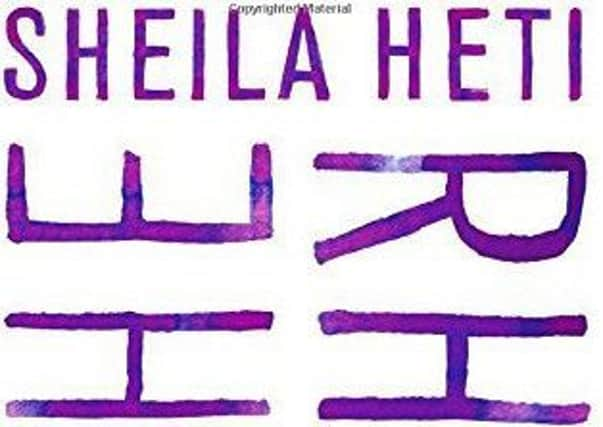Book review: Motherhood, By Sheila Heti


Motherhood is self-examination elevated to an art form, and in writing it she seems to not only be putting off the question for her last remaining biologically fertile years, but using her artistic creativity to produce another kind of baby, the book.
The protagonist is in her late 30s, living with a boyfriend, who has a child from a previous relationship. He isn’t keen to have another, but ultimately leaves the decision up to her.
Advertisement
Hide AdIt is this decision which contorts Heti, as she argues both sides and grasps for answers from scriptures, dreams, prophecies and the experience of friends.
She writes: “If I want a child, we can have one, he said, but you have to be sure.” This is a curse rather than a blessing, the caveat revealing her ambivalence. “Whether I want kids is a secret I keep from myself – it is the greatest secret I keep from myself.”
In a note at the start, Heti states: “In this book, all results from the flipping of coins are true.” This refers to a simplified version of I Ching, a divination where questions are answered by the way three coins land.
In response to her vivid dreams of motherhood, there are conversations with the coins asking questions such as: “Is making babies a woman’s special task?” and when answered in the affirmative, “Can a woman who makes books be let off the hook by the universe for not making babies?”
The answer to that one is yes as well, but because of the random nature of the replies, these meandering conversations end up as a sort of nonsensical game, sometimes funny, but eventually irritating.
The same is true of the philosophical discussion of whether choosing to not be a mother defines one as the negative of someone else’s positive identity. Heti says: “In fact, I am not not a mother. By which I mean I am not ‘not a mother.’” The repetition of “not not” eventually grates but it also mirrors the repetition of the two sides of her argument, which she comes back to again and again from all angles.
Advertisement
Hide AdBut just as some passages are exasperating, others are beautifully written and profound. Reading about a 19th century rabbi, who prophesied that his daughter will have three children, she says: “Two boys and one girl and the names of the boys are given, and what they grew up to be, but the name of the daughter is not given, nor what she grew up to be (presumably a mother).” This is a woman’s role in history, not as an end in herself, but as a passageway through which a man might come.
As a Jewish woman she discusses the expectation that she should help repopulate after the losses of the Holocaust. A religious cousin has six children, Heti has written six books, again linking the two acts of creation.
Advertisement
Hide AdShe says: “Might it not be better to say, We have learned from our history about the farthest reaches of cruelty, sadism and evil. And so, in protest, we will make no more people...no more aggressors, and no more victims, and in this way, do a good thing with our wombs.”
Motherhood, like motherhood itself, will divide opinion. It is either a magnificent depiction of introspection, and the opportunity to make a positive choice to be childless, or it is the definitive example of someone really overthinking the question.
Motherhood, By Sheila Heti, Harvill Secker, 304pp, £16.99